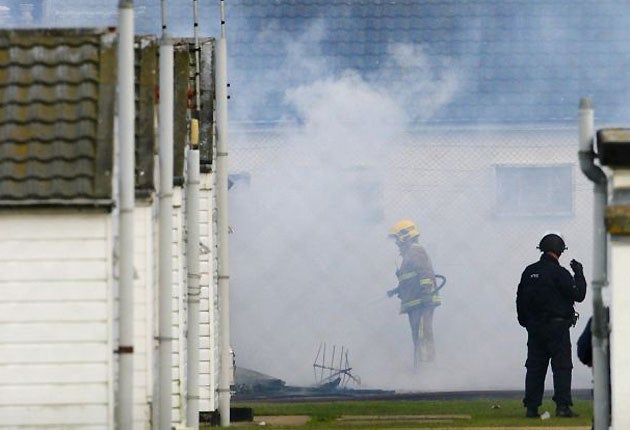Open prison 'was failing' before riot

An open prison where buildings were burnt to the ground during a riot was "failing" in its fundamental role, inspectors have found.
Around 40 inmates took part in a New Year's Day mutiny at Ford Prison near Arundel, West Sussex, which saw buildings torched after an attempted clampdown on contraband alcohol.
Inspectors, who visited a month before the riot, had "serious concerns" about the prison, which they found was failing to prepare inmates for life back in the community.
They also found security was undermined by poor relationships between staff and prisoners.
More than 40% of prisoners surveyed said it was easy to obtain illegal drugs and staffing shortages meant many random drug tests could not be carried out within the necessary timescales.
Alcohol breath testing at the jail was also found to be "unsophisticated".
Inspectors said alcohol remained an issue, having noted in a previous report that alcohol smuggling had become a "significant problem".
HMP Ford is a category D prison, which the prison service defines as being for offenders "who can be reasonably trusted in open conditions".
Chief Inspector of Prisons Nick Hardwick said: "HMP Ford was not without strengths but it was clear during the inspection that the trust on which the smooth running of the prison depended was in short supply, and the prison was failing to deliver its fundamental resettlement role effectively."
A number of strengths were noted during the inspection.
HMP Ford was found to be safe for most prisons, while care for vulnerable prisoners at risk of suicide and self-harm was good.
Positive efforts had been made to improve security, inspectors said, with fewer inmates absconding.
The report found the use of force was low and health care was good, and improvements were noted in inmates' work, training and education.
Mr Hardwick added: "Open prisons have a crucial role in preparing low risk, particularly long-term prisoners for life back in the community. They do this by testing prisoners in low security conditions and gradually reintroducing them into society.
"Most open prisons perform this role effectively. Unfortunately, this was not the case at Ford. Instead, poor relationships were undermining the development of a strong positive culture, essential to responsible living and dynamic security.
"Ford's resettlement and offender management are critical weaknesses for a prison that should be focused squarely on preparing prisoners for a return to the community.
"The practical resettlement needs of individual prisoners should shape the entire approach of this establishment, something that we have now had to repeat at too many inspections. There have been some recent improvements but this time there must be sustained progress supported at every level."
Michael Spurr, chief executive officer of the National Offender Management Service, said: "I am grateful to the chief inspector for this report which reflects both the strengths and weaknesses at Ford.
"We have put additional support in place to strengthen the management of the prison and we will use the recommendations in the report to improve the performance of the establishment.
"I am pleased the good work done by the prison, on safety, suicide and self-harm, healthcare and improved security with fewer absconds, has been acknowledged."
Juliet Lyon, director of the Prison Reform Trust, said: "Open prisons perform a vital role preparing long-term prisoners to lead a law-abiding life on release. Most do this effectively. Today's report on Ford reveals a worrying lack of urgency to deal with problems of poor resettlement, and the influx of drugs and alcohol, which were raised by the inspectorate in 2009."
